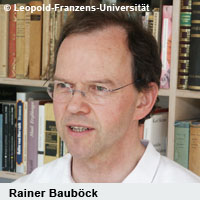European Latsis Prize recognises migration researcher
This year's European Latsis prize has gone to Austrian Rainer Bauböck for his in-depth research on migration issues. Sponsored by the Geneva-based Latsis Foundation, the annual prize of CHF100,000 (€65,000) is awarded by the European Science Foundation (ESF) to an individual or group who, in the opinion of their peers, has made the greatest contribution to a particular field of European research. This year, the chosen theme was 'immigration and social cohesion in modern societies'. 'Since 1999, the European Latsis Prize has rewarded researchers who have made outstanding progress in European research. Professor Bauböck is at the forefront of the migration field and his contribution to this area is unprecedented,' said ESF President Ian Halliday, who presented the prize. Speaking at an award ceremony in Strasbourg on 30 November, Professor Bauböck said the prize meant a great deal to him and his work. 'I suspect that people who choose an academic career are generally driven by a strong desire for recognition by their peers. This is what the Latsis Prize means to me personally,' he said. A political scientist and senior researcher at the Austrian Academy of Sciences' Institute for European Integration Research, Professor Bauböck has been focusing on the question of how migration challenges and changes concepts and the boundaries of democratic citizenship. The professor said that the prize would also help to give greater recognition to migration research as a scientific discipline. Although migration issues are often the subject of public policy debate, the study of them is often at the margin of science, he added. Professor Bauböck said that it was important to strengthen migration research given the fact that it addresses one of the most important contemporary challenges for European societies, and contributes to the evolution of the social sciences overall. Migration research is often innovative because it requires interdisciplinary approaches and challenges traditional perspectives that still operate with background assumptions about closed national societies, he added. To advance migration research further, Professor Bauböck announced that he would be contributing €22,000 of his prize money to sponsor an award for the best Austrian dissertation on migration research. A further donation of €10,000 will go to Austrian non-governmental organisations (NGOs) working with refugees and migrants, or combating racism and xenophobia in Austria.
Countries
Austria



